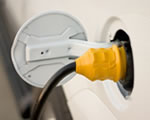 Go to main content
Go to main content
Archive Website of the UK government
Please note that this website has a UK government accesskeys system.
Main menu
Page menu
Environment and greener living

Greener fuels for cars

The type of fuel you use in your car can make a big difference to your impact on the environment. Learn about greener fuel alternatives to petrol – like electricity and biofuels – that produce less carbon dioxide when you drive.
Why choose greener fuels?
Driving cars produces more carbon dioxide – one of the main greenhouse gases responsible for climate change – than any other type of travel in the UK.
Petrol is the vehicle fuel that creates the most carbon dioxide (CO2). Using a car that runs on an alternative to petrol can reduce your CO2 emissions from driving.
Diesel
Diesel engines produce less CO2 than petrol cars but currently produce more air pollutants. This is set to change, and in the future diesel cars will be almost as clean as petrol cars in terms of pollutants.
For more information on diesel and petrol, see ‘Buying a car: green tips’.
Electric cars (EVs)
Electric cars (sometimes called EVs, for ‘electric vehicles’) are cars that get some or all of their power from batteries.
Some electric cars are advertised as being able, in ideal conditions, to travel up to 100 miles between being charged. If you regularly take trips longer than this, plug-in hybrids may be more suitable – see the paragraph on this page, ‘Hybrid electric vehicles’.
Costs and the Plug-In Car Grant
Electric cars cost more to buy than a petrol or diesel car. However, from January 2011, the Plug-In Car Grant will be available to help with the cost. For more information, see ‘Plug-In Car Grant’.
Electric cars benefit from:
- zero rates of Vehicle Excise Duty (vehicle tax)
- local incentives, like 100 per cent discount from the London congestion charge and free parking
Recharging your car
You can charge your electric car at home. This is safe, but you’ll need to get appropriate advice to make sure your home wiring is suitable, from:
- a registered electrician
- an electric vehicle manufacturer
- or another specialist
There are a number of EV charging points around the UK. Contact your local council to find out where.
Europe and the UK are currently working to allow EV owners to use charging points across Europe.
Environmental impact
EVs don’t produce tailpipe (exhaust) emissions when they’re driven. This makes them a good choice for urban driving, where air quality is a consideration. Instead, emissions are produced at the power station generating electricity for the vehicle.
Vehicles that use electricity from renewable sources (like wind power) already produce less CO2 and air pollutants than petrol and diesel equivalents. This will continue to improve as the amount of renewable electricity produced in the UK increases.
Hybrid electric vehicles
Hybrid cars use a petrol or diesel engine combined with a battery, and are very fuel efficient without any compromise on performance. The battery recharges as you drive.
At slower speeds (up to 30 miles per hour), the car runs on battery power. This uses less petrol when driving and reduces CO2 emissions.
Hybrid vehicles that plug into the mains electricity supply are known as 'plug-in hybrids' or ‘PHEVs’ and may qualify for the Plug-In Car Grant. Those that don't plug in won't qualify.
Biofuels
Biofuels, for example biodiesel and bioethanol, are made from plant materials like vegetable oils or wheat.
How to use biofuels
Biofuels can be mixed with ordinary diesel or petrol and used in normal cars. Much of the diesel available in the UK, and some petrol, contains biofuel. Petrol contains up to a maximum of 5 per cent and diesel 7 per cent.
Environmental impact
Biofuels can reduce climate change impacts because the plants they're made from remove carbon dioxide (CO2) from the air when they grow. This helps balance out the CO2 emissions produced when the fuel is used in a car.
There are concerns that some biofuels compete with food production or contribute to deforestation. The government encourages the sustainable production of biofuels by making biofuel suppliers report on:
- where the fuels are produced from
- other information, like the greenhouse gas emissions saved by the fuels
Liquefied petroleum gas (LPG)
LPG is mainly made up of propane and is obtained as a by-product of oil refining or from natural gas fields.
Converting cars to LPG
LPG can be used as fuel in most petrol engines after they have been converted. Conversions can be dangerous if not done correctly, so you should:
- check with your car’s manufacturer before getting the engine converted
- only use an installer approved by UKLPG, the association for the LPG industry
Most LPG vehicles are bi-fuel (or ‘dual fuel’), meaning they can run on either LPG or petrol. This lets the vehicle use petrol in areas where LPG isn’t available.
Costs
It typically costs from £1,600 to convert a car to LPG, depending on the vehicle. LPG cars qualify for a lower rate of car tax, as they are classed as ‘Alternative Fuel Cars’.
Environmental impact
Vehicles using LPG perform like petrol vehicles, but produce:
- about 14 per cent less carbon dioxide (CO2) than equivalent petrol engines
- similar emissions of nitrogen oxides (NOx) and particulates (soot) to petrol vehicles
- much lower NOx and particulate emissions than all but Euro 6 diesel engines (for more on Euro 6, see ‘Buying a car: green tips’)
- slightly more CO2 than diesel engines
NOx and particulates are both harmful to human health – the article ‘Air pollution’ explains how.
Fuel cell vehicles
A fuel cell combines hydrogen with oxygen from the air to produce electricity to drive a vehicle. This type of vehicle is still being developed and is not commercially available yet.
 Facebook
Facebook Twitter
Twitter StumbleUpon
StumbleUpon Delicious
Delicious Reddit
Reddit